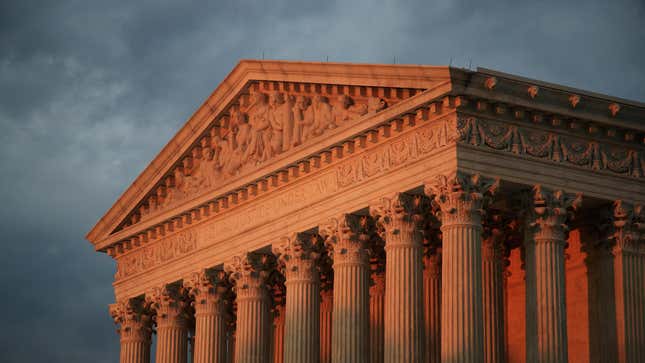
The U.S. Supreme Court ruled Thursday in West Virginia vs. EPA in favor of plaintiffs who argued that the Environmental Protection Agency does not have the power to regulate carbon dioxide from power plants—the country’s second-largest source of CO2 emissions—without input from Congress.
The ruling almost completely disrupts any major plans to fight climate change at the federal level in the U.S., and is likely to have wide-ranging implications for federal agencies looking to protect public health under bedrock laws like the Clean Air Act. It also signals how the court is likely to rule in other environmentally damaging cases in the pipeline.
The vote was 6 to 3, with the court’s three liberal members in dissent. Chief Justice John Roberts, writing for the majority, said that Congress had not explicitly given the EPA the authority to regulate emissions as it designed the Clean Power Plan to do.
“There is little question that the petitioner States are injured, since the rule requires them to more stringently regulate power plant emissions within their borders,” Roberts wrote in the opinion.
In a dissenting opinion, Justice Elena Kagan wrote that the court’s decision “strips the Environmental Protection Agency (EPA) of the power Congress gave it to respond to ‘the most pressing environmental challenge of our time.’”
The court’s decision follows a series of major policy reversals, including a devastating rollback on abortion rights, by one of the most conservative Supreme Courts in history, created by a dark-money network powered by pro-polluter interests. And it isn’t done wreaking havoc on public health just yet.
What is West Virginia vs. EPA?
This case is a strange one for a lot of reasons, and it’s been a winding road of confusing legal moves to get to today’s catastrophic decision. The host of plaintiffs, which include several attorneys general from Republican states and two coal companies, essentially brought a preemptive case against the Biden administration’s EPA as it worked on its own rule to replace the Obama administration’s 2015 Clean Power Plan.
The Clean Power Plan, which proposed to reduce emissions from the power sector by setting reduction targets that states would have needed to meet, never actually went into effect; it was tied up in conservative court challenges for years (including one led by West Virginia Attorney General Patrick Morrisey, who is leading this current challenge) before being ultimately repealed by the Trump administration in 2018. Complicating matters even further, in 2021, during the waning days of the Trump administration, a federal judge repealed the rejection of the Clean Power Plan as well as Trump’s weak replacement for the policy.
Even weirder still, the Biden administration actually hasn’t introduced its replacement policy yet—there’s currently no EPA regulation of the power sector actively on the books. Usually, Supreme Court cases are based around an actual policy or piece of regulation that is in play, but this case is based on the idea of what the agency is able to do under the Clean Air Act. The fact that the conservative Court took up this case against a theoretical policy and ruled in favor of the plaintiffs signals that it is more willing to take an active hand in dismantling federal agencies’ ability to regulate than the role the judicial branch would normally play.
“This is a Court that’s now taking on a series of precedents like we’ve never seen a Court do, really, in our lifetime,” said Lisa Graves, who served in the U.S. Department of Justice and now runs True North Research, a public policy watchdog group. “For this Court to try to take away the EPA’s power, it’s not inside baseball—it’s a dramatic departure from federal policy, from legal precedent.”
Why is the court’s ruling important?
The decision technically places the responsibility for regulating emissions from the power sector into the hands of the legislative branch. In a well-functioning democracy, Congress would be able to pass laws that would then direct the EPA to regulate emissions and pollution through specific mechanisms. But as anyone who has been paying any attention at all to the state of national U.S. politics can tell you, climate action in Congress has been dead in the water for the past decade or more. This, experts say, was a core part of the plan of the special interests that brought this case forward.
“The Court is not naïve,” Graves said. “The majority knows that Republicans have blocked in Congress every major significant effort to mitigate climate change in the past few decades. They know that some of the same forces that are behind the amicus briefs [in this case] have been able to thwart Congress’s ability to craft new laws to address this.”
And the interests lining up behind this case are powerful. The amicus briefs filed in support of the plaintiffs’ position read like a who’s who in organizations that have fought tooth and nail for polluters, including the Competitive Enterprise Institute, which has been a force in spreading climate denial, and the Americans for Prosperity Foundation, an advocacy group founded by the billionaire Koch brothers, arguably two of the most powerful pro-oil and gas political funders—and spreaders of climate denial—in recent decades. Charles Koch himself, Graves said, was a notable driving force in creating the conditions for this case, as well as other cases that could be teed up before this court. Many of the judges currently sitting on the court were nominated thanks to campaigns funded by some of the same pro-pollution donors behind this case. And this landmark ruling may be just the beginning of their attempts to give even more freebies to polluters.
“This case represents a victory for right-wing infrastructure that has been funded by Koch and other anonymous donors to try and strip away the power of our federal agencies to regulate industries, like Koch industries, the oil and gas industry, and more,” Graves said.
Editor’s note: This is a breaking news story, and will be updated as news develops.